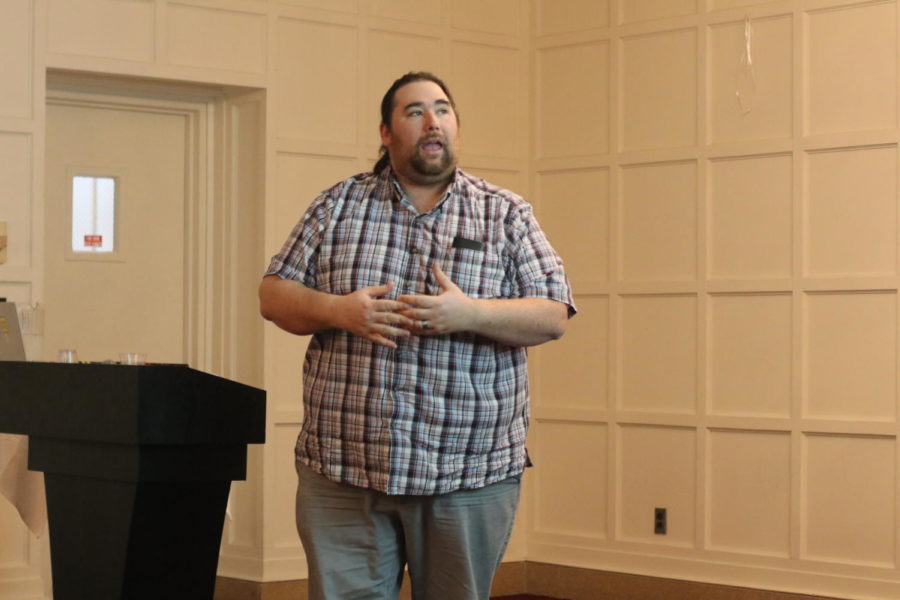Collaboration with Native populations and universities: a panel discussion
Jeffrey Burnette, assistant professor of economics at the Rochester Institute of Technology, presents at the American Indian Symposium on March 26 in the Cardinal Room of the Memorial Union.
March 26, 2018
Recruit, retain, and return.
These are the principles with which panelists encouraged Iowa State to grow their relationships with Native American communities.
Jason Younker, along with fellow panelist Jeffrey Burnette, shared these principles with attendees Monday evening.
Younker is the assistant vice president and adviser to the president on sovereignty and government-to-government relations at the University of Oregon. Burnette is an assistant professor of economics and director of the Native American Future Stewards Program at the Rochester Institute of Technology
Burnette and Younker worked together in the Native American Future Stewards Program, as Younker was the former president before Burnette moved into his position and Younker moved to the University of Oregon.
Burnette and Younker both spoke to the importance of the ideas of recruiting, retaining, and returning in their respective programs.
Recruiting was defined as going into tribal communities and personally recruiting individual students to the university. The importance of coming into communities and being approachable as well as establishing relationships is important to recruitment of Native American students. It was stressed that tribal communities would not first go to universities if universities did not reach out to build relationships.
Younker and Burnette shared their personal experiences at their respective universities that contributed to the retention of Native American and Native Alaskan students and the importance of creating a support system.
“Never had an institution prepared the path for a native student to come from the reservation with with political backing and support to a university who has their back, who is willing to go the extra mile to try to understand what the issues are and to help make them successful,” Younker said.
President of the Association of Indigenous Anthropologists and a faculty member at Oglala Lakota College in South Dakota, Richard Meyers, shared some of the structural and systematic factors that contribute of the Native American experience.
“The history of native people or black people in this country is something that’s real tough for America to get beyond when you’re trying to applaud land grant institutions that are about everybody and then you watch Martin Luther King say, ‘No they really weren’t for everybody. They were for certain people,’” Meyers said.
Meyers said that while the past cannot be changed, Americans can recognize the wrongs they’ve done, with Meyers specifically noting the massacre at Wounded Knee in South Dakota. He said they need to recognize that tribes were forced from lands, and in recognition, the United States can begin to move forward.
Younker also spoke on systematic and social hardships that Native Americans face in regards to attendance and retention at universities.
“If you have a parent that went to college they may have told you ‘You’re going to college,’” Younker said. “That’s what I told my kids, ‘You’re going to college,’ but if you don’t have that familiarity and education emphasis in the home then you’re not inspired to go off to college.”
Iowa’s one federally recognized tribe, the Meskwaki, have a reservation located in Tama, Iowa — roughly 45 minutes away from Ames. According to the fall 2017 admission report, Iowa State has a population of 57 students who self identify as American Indian or Alaska Native, with two self identifying individuals in the College of Veterinary Medicine, and 13 graduates.
Younker said the top reason for dropping out of college for Native American students is loneliness, expressing the importance of making universities feel “like home” for Native American students. Younker compared the experience of being a Native American student at a school that doesn’t have proper systems in place to being alone as a student in Yemen.
Younker continued to explain that for many Native Americans, college simply doesn’t present itself as an option financially. According to Younker, 62 percent of the Native American and Alaska Native population live below the median income level. According to Younker, because of this systematic poverty, many Native Americans don’t see college as an option, and find out of state tuition to be entirely out of reach.
Furthermore, Younker stated that lack of support played a role in low rates of attendance and retention at 4 year institutions. According to Younker, the fact that only 17.6 percent of Native Americans and Alaska Natives have a parent who has a bachelor’s degree or more contributes to the reality that of the 69 percent of Native Americans and Alaskan Native students who obtain a high school degree, only 1 percent further their education at a 4-year institution.
A Q&A will be held Tuesday from 2-3 p.m. in Pearson 3112, followed by a roundtable discussion that will be held at 3:30 p.m. in Lagomarcino 2660, talking specifically about Native Communities in the Iowa K-12 curriculum.







